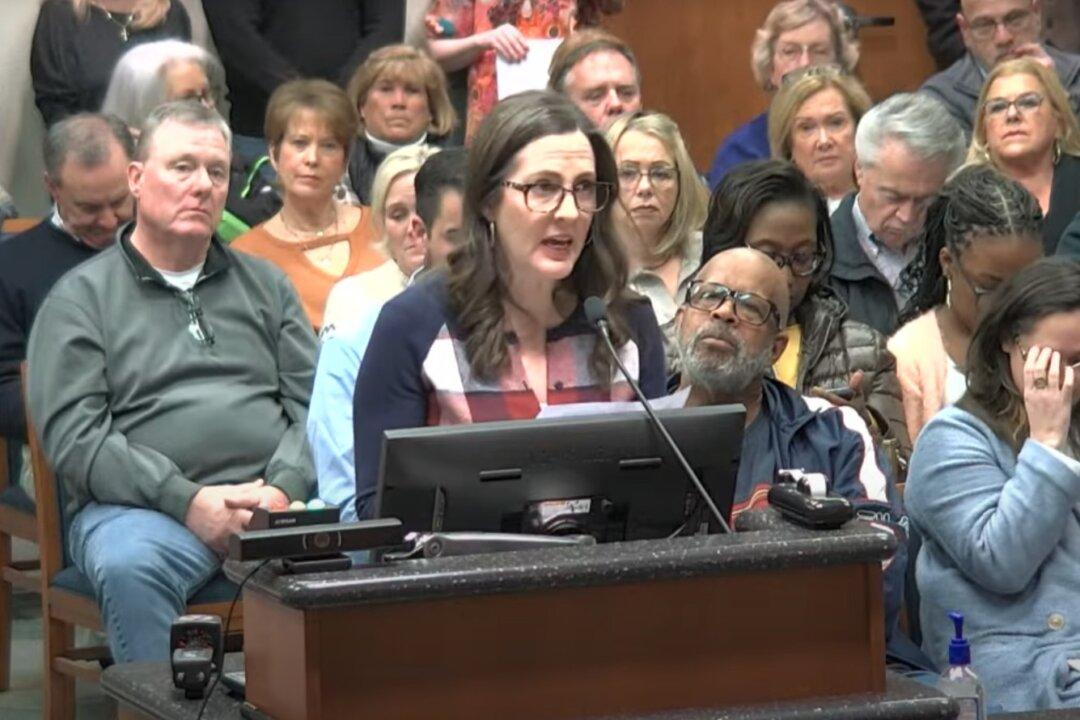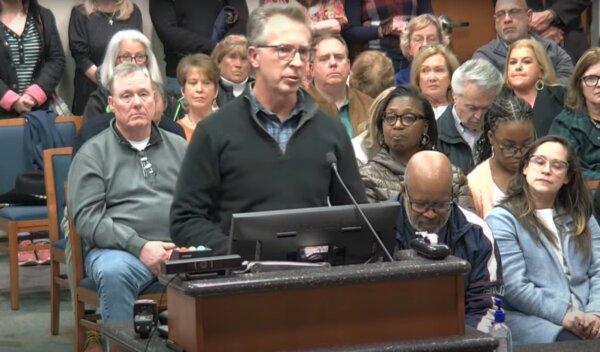https://www.theepochtimes.com/us/in-depth-north-carolina-commissioners-vote-to-remove-fluoride-from-water-5583299?utm_source=partner&utm_campaign=imctgm01
IN-DEPTH:
North Carolina Commissioners Vote to Remove Fluoride From Water
Doctor argues that the fluoride in water supplies is not medical-grade fluoride but hydrofluorosilicic acid, a waste product from the fertilizer industry.


Updated:
The question isn’t whether fluoride is good or bad; it’s whether the public consents to being medicated without their agreement, according to proponents of a North Carolina county ordinance that aims to discontinue its use in the local water supply.
During public comment at the meeting, the argument centered around medical freedom for those against using fluoride in the water supply, while those in favor of mass fluoridation leaned into a familiar “safe and effective” stance, declaring that it’s been used for decades.
“Just because this is a practice that’s been done for 50 to 70 years doesn’t mean it’s the right thing to do now,” Brian Helms, vice chair of the board, told The Epoch Times when he explained why he voted against fluoride in the water.
Local, state, and federal governments have the authority to treat water, but not the authority to treat people, he added.
“We’ve heard strong opinions from both sides,” Mr. Helms said. “We’ve heard people quote studies for fluoride being bad for public health and studies that say it’s good. What it really boils down to is whether an elected board has the authority to forcibly medicate its residents.
“Personally, I don’t believe that we do, and there’s not a single one of us who has a medical license. None of us can write prescriptions. Furthermore, there’s been no consent.”
‘Safe and Effective’
Mark Moss, a director of Public Health Dentistry at the East Carolina University School of Dental Medicine said, “The fluoride is present in low amounts to prevent extensive decay. Some decay still occurs, but fluoride in our water systems greatly reduces the amount of decay that people experience.”
Dr. Moss, as well as other dentists who spoke in favor of fluoride, said it benefits those who don’t have access to good dental health care plans, such as those in low-income groups.
Harold Schmoecker said the commissioner’s decision to discontinue fluoride would be a “significant achievement” that would reverse “60-plus years of poisoning the public.”
“It could be the most significant action that any Union County Board of Commissioner has ever done,” he said.
Mr. Schmoecker cited Dr. Carl McMillan, former president of the International Academy of Oral Medicine and Toxicology (IAMT) and founder of Holistic Dental Centers in Cary and Cornelius, North Carolina. Dr. McMillan has argued that the fluoride used in water supplies is not medical-grade fluoride but hydrofluorosilicic acid, a waste product from the fertilizer industry that the Environmental Protection Agency will not allow to be dumped in landfills or vaporized into the air.
In addition, there’s never been a clinical randomized trial showing that it’s “safe and effective.” Finally, there’s no control over the dose, he said.
“The bottle-fed baby will ingest 250 times the amount that’s in natural mother’s milk,” he said. “This is the only drug that’s given with no prescription and no consideration for an individual’s health status.”
Dr. Allison McMahon spoke next, telling the board that she primarily treats Medicaid patients, who, she said, are at a higher risk for tooth decay, which often “puts their systemic health at risk.”
“The cost burden of this population’s dental care on taxpayers is already staggering and by removing a passive preventative measure like community water fluoridation will have astronomic financial results on the taxpayer,” Dr. McMahon said.
He addressed much of Western Europe’s refusal to allow fluoridation of their water, as well as the conflicting statistics from the Centers for Disease Control and Prevention (CDC) that compare non-fluoridated areas to fluoridated populations in relation to tooth decay rates.
Maria Reid told the board that it should not be concerned with whether fluoride is good or bad, nor with what the CDC and medical professionals say.
“What you should care about is authority and consent,” she said. “You do not have the authority to make medical decisions on my behalf. Only I have that right and that authority.”

‘Grossly Immoral’
Abigail Prado asked the board “to consider the ethical implications of adding fluoride to our public drinking water.”
“The practice of adding fluoride to our water is grossly immoral because it goes against all medical ethics and deprives the citizens of Union County to have the right to medical consent,” Ms. Prado said. “Medical ethics dictate that individuals have the right to make informed decisions about their own health by adding fluoride to public drinking water.”
She added that such blanket treatment can harm those with pre-existing medical conditions or those whose bodies may not process fluoride well.
Fluoridating the water may also contribute to potential overexposure because of the amount of fluoride in other products such as toothpaste.
“Research has shown that any exposure to fluoride is harmful, but such uncontrolled exposure to the public is gravely negligent by denying individuals the right to consent and failing to account for their unique medical needs,” she said.
Dr. Margaret Lochary then spoke in favor of fluoridation of the water, calling it the “single most effective public health measure to prevent tooth decay.”
“The Centers for Disease Control and Prevention has proclaimed community water fluoridation, along with vaccinations and infectious disease control, one of the ten greatest public health achievements of the 20th century,” Dr. Lochary said.
Britney Bouldin told the board that she doubts the benefits of fluoride outweigh the harm.
“On the one hand, we have an established practice that you can’t question without being called crazy,” Ms. Bouldin said. “On the other hand, you have credentialed scientists sounding the alarm about harm and being silenced for speaking up. Sound familiar?”
This returns the average person to a place of being unsure of whom to trust, she said.
“But what I am sure about is that our default position should always be, first, to do no harm,” she said. “To do this, we have to revisit the assumption that one size fits all when it comes to medicine. We have to reject the practice of giving medication or requiring the medication to be given in a blanketed way. You see, all bodies are different and respond differently.”
Crystal Adams, director of the North Carolina Oral Health Collaborative, spoke in favor of water fluoridation for the county.
“Access to regular dental care is where it can be challenging for citizens of North Carolina,” Ms. Adams said. “Not everyone is able to go to a dental office even if they have a dental office just down the street because they may not accept their insurances, so fluoride may be their only means of getting available measures for oral health.”
Mark Pittman was one of the last people to speak before the board. He said that, amidst all the debate over whether fluoride is good or bad, not one medical professional has addressed “the real culprits of dental health,” which are poor diet choices such as sugar, sodas, and processed foods.
“I grew up on a farm on well water and I think I’ve had two minor cavities in my entire life, not because of fluoride in our well water but because we grew our food and we just didn’t eat improperly,” he said. “So, can we attest to that as the culprit of my success? I don’t think so, but I think we can easily see how our diets today are contributing to tooth decay. I don’t think any dentists here would disagree with that premise.”
However, there remains the matter of medical freedom, he said.
“We should have our rights represented and if we don’t want it in there, we shouldn’t have it in there,” he said. “And if it’s so inexpensive, and if we’re concerned about folks that are low income, poor people, whatever, then let’s provide it to them, separately, from the water.”

‘We Didn’t Consent’
During a discussion on the vote, Commissioner David Williams stated that the issue is about freedom of choice and consent.
“This is a wonderful country full of freedom and what we decide to put in our bodies is chief among those freedoms,” Mr. Williams said. “The good news is if you like fluoride, and you like its topical use, there are all kinds of products out there you can purchase, and they’re not expensive. They’re available to the rich and poor and middle class and everybody along the spectrum, so availability is not an issue.”
There are a lot of chemicals used to treat the water, he said, but this is the one chemical added to treat people.
“And that’s something we didn’t consent to,” he said.
Board chairman J.R. Rowell later told The Epoch Times why he voted in favor of keeping fluoride in the water system.
“I voted no on the motion to remove fluoride in our water treatment process because I heard conflicting information and I don’t have strong enough information to support changing the current process,” Mr. Rowell said. “I certainly respect the opinions and votes of all the current board members.”
Commissioner Melissa Merrell told The Epoch Times that the new Yadkin River Water Treatment Plant had its grand opening in 2023. Following the opening, constituents began attending the meetings to discuss concerns about fluoride in the water.
“They brought up enough concerns that the board asked staff to look into it,” she said.
She was told by staff that a minimal amount of fluoride was put in the water. As a fiscal conservative, she questioned, then, why put in any at all when it’s so widely available in consumer products.
County staff told The Epoch Times, that $12,310.34 has been spent on fluoride for the plant, which will be operational “within the next month.”
“Based on 3.5 million gallons per day, we are projected to spend $8,354.73 on fluoride in FY25, and $26,598.12 over the next three years,” they revealed.
Fluoride’s History
BBC investigative reporter and author of “The Fluoride Deception,” Christopher Bryson, said in a documentary on his research that the suggestion that fluoride be added to the water supply came from Gerald Cox, a researcher at the Mellon Institute of Industrial Research in Pittsburgh, Pennsylvania.
He said Mr. Cox became interested in fluoride because of the prodding of the chief scientist of the Aluminum Company of America, Francis Frary, who was concerned about fluoride pollution around aluminum plants and what it was doing to employees. Mr. Frary recommended that Mr. Cox look into fluoride’s effects on teeth.
“It’s upon the basis of that suggestion that Mr. Cox made his proposal to add fluoride to public water supply,” he said. “Right at the very source of the stream you find the aluminum industry.”
Mr. Cox’s proposal needs to be looked at in context, Mr. Bryson said, considering that his place of employment, the Mellon Institute, was “a leading defender of the asbestos industry.”
“Today, industry is facing a tidal wave—a crippling tidal wave—of lawsuits from people who have had their health damaged and killed by asbestos,” he said. “For generations, the Mellon Institute produced research that said that mesothelioma was caused by something other than asbestos. That’s how you have to understand the fluoride issue.
“Industry was concerned about fluoride pollution and about lawsuits of a similar magnitude, so it’s no coincidence that the Mellon Institute made the first suggestion that fluoride be added to public water supplies.”
From there, the history of fluoride is one of conflicts of interest and cover-ups, he said.
Dr. Harold Hodge, a leading toxicologist of the early 20th century and advocate for fluoride in the water at a time when many were calling for its removal, said that “health hazards do not justify postponing water fluoridation.”
“Harold Hodge we now know was the co-orchestrator of the human radiation experiments in which citizens in hospitals in Rochester and Oakridge were injected with plutonium by scientists under Harold Hodge’s direction,” Mr. Bryson said.
‘What’s the Connection?’
“Join the dots,” he said. “Harold Hodge and the University of Rochester are injecting people with plutonium and uranium, and at the same time, they are reassuring us about fluoride safety. What’s the connection?”
Dr. Hodge served as the director of the U.S. Atomic Energy’s Division of Pharmacology and Toxicology and was the chief toxicologist for the Manhattan Project. In this role, he investigated the toxicity of the chemicals used in the development of the atomic bomb.
One of those chemicals was fluoride, for which atomic bomb production needed “enormous quantities,” Mr. Bryson said.
Mr. Bryson said that Dr. Hodge was asked to come up with medical information to help the government in lawsuits where the U.S. Army was charged with causing pollution and injuries through fluoride contamination.
‘Union County Has Not Been Offered a Choice’
But for board members like Ms. Merrell—fluoride’s controversial history aside—it comes down to choice.
Ms. Merrell recalled where she raised her children. There was no fluoride in the water, so her pediatrician offered her a prescription for fluoride drops so that her children could have access.
“That was a prescription I could accept or not accept,” she said. “My family was offered a choice. Union County has not been offered a choice.”



Friends Read Free